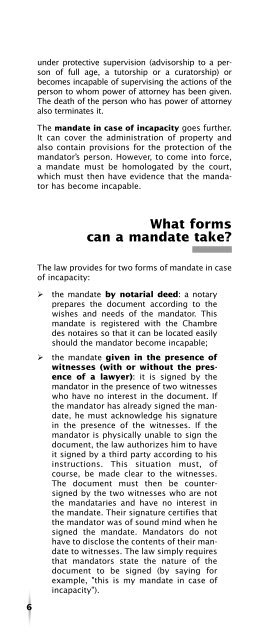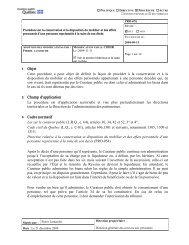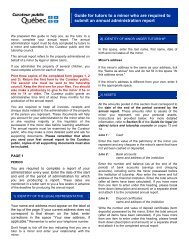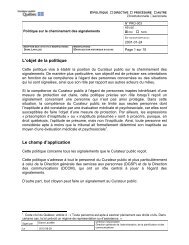My mandate in case of incapacity - Le Curateur public du Québec ...
My mandate in case of incapacity - Le Curateur public du Québec ...
My mandate in case of incapacity - Le Curateur public du Québec ...
Create successful ePaper yourself
Turn your PDF publications into a flip-book with our unique Google optimized e-Paper software.
6<br />
under protective supervision (advisorship to a person<br />
<strong>of</strong> full age, a tutorship or a curatorship) or<br />
becomes <strong>in</strong>capable <strong>of</strong> supervis<strong>in</strong>g the actions <strong>of</strong> the<br />
person to whom power <strong>of</strong> attorney has been given.<br />
The death <strong>of</strong> the person who has power <strong>of</strong> attorney<br />
also term<strong>in</strong>ates it.<br />
The <strong>mandate</strong> <strong>in</strong> <strong>case</strong> <strong>of</strong> <strong>in</strong>capacity goes further.<br />
It can cover the adm<strong>in</strong>istration <strong>of</strong> property and<br />
also conta<strong>in</strong> provisions for the protection <strong>of</strong> the<br />
mandator’s person. However, to come <strong>in</strong>to force,<br />
a <strong>mandate</strong> must be homologated by the court,<br />
which must then have evidence that the mandator<br />
has become <strong>in</strong>capable.<br />
What forms<br />
can a <strong>mandate</strong> take?<br />
The law provides for two forms <strong>of</strong> <strong>mandate</strong> <strong>in</strong> <strong>case</strong><br />
<strong>of</strong> <strong>in</strong>capacity:<br />
ÿ the <strong>mandate</strong> by notarial deed: a notary<br />
prepares the document accord<strong>in</strong>g to the<br />
wishes and needs <strong>of</strong> the mandator. This<br />
<strong>mandate</strong> is registered with the Chambre<br />
des notaires so that it can be located easily<br />
should the mandator become <strong>in</strong>capable;<br />
ÿ the <strong>mandate</strong> given <strong>in</strong> the presence <strong>of</strong><br />
witnesses (with or without the presence<br />
<strong>of</strong> a lawyer): it is signed by the<br />
mandator <strong>in</strong> the presence <strong>of</strong> two witnesses<br />
who have no <strong>in</strong>terest <strong>in</strong> the document. If<br />
the mandator has already signed the <strong>mandate</strong>,<br />
he must acknowledge his signature<br />
<strong>in</strong> the presence <strong>of</strong> the witnesses. If the<br />
mandator is physically unable to sign the<br />
document, the law authorizes him to have<br />
it signed by a third party accord<strong>in</strong>g to his<br />
<strong>in</strong>structions. This situation must, <strong>of</strong><br />
course, be made clear to the witnesses.<br />
The document must then be countersigned<br />
by the two witnesses who are not<br />
the mandataries and have no <strong>in</strong>terest <strong>in</strong><br />
the <strong>mandate</strong>. Their signature certifies that<br />
the mandator was <strong>of</strong> sound m<strong>in</strong>d when he<br />
signed the <strong>mandate</strong>. Mandators do not<br />
have to disclose the contents <strong>of</strong> their <strong>mandate</strong><br />
to witnesses. The law simply requires<br />
that mandators state the nature <strong>of</strong> the<br />
document to be signed (by say<strong>in</strong>g for<br />
example, "this is my <strong>mandate</strong> <strong>in</strong> <strong>case</strong> <strong>of</strong><br />
<strong>in</strong>capacity").

















